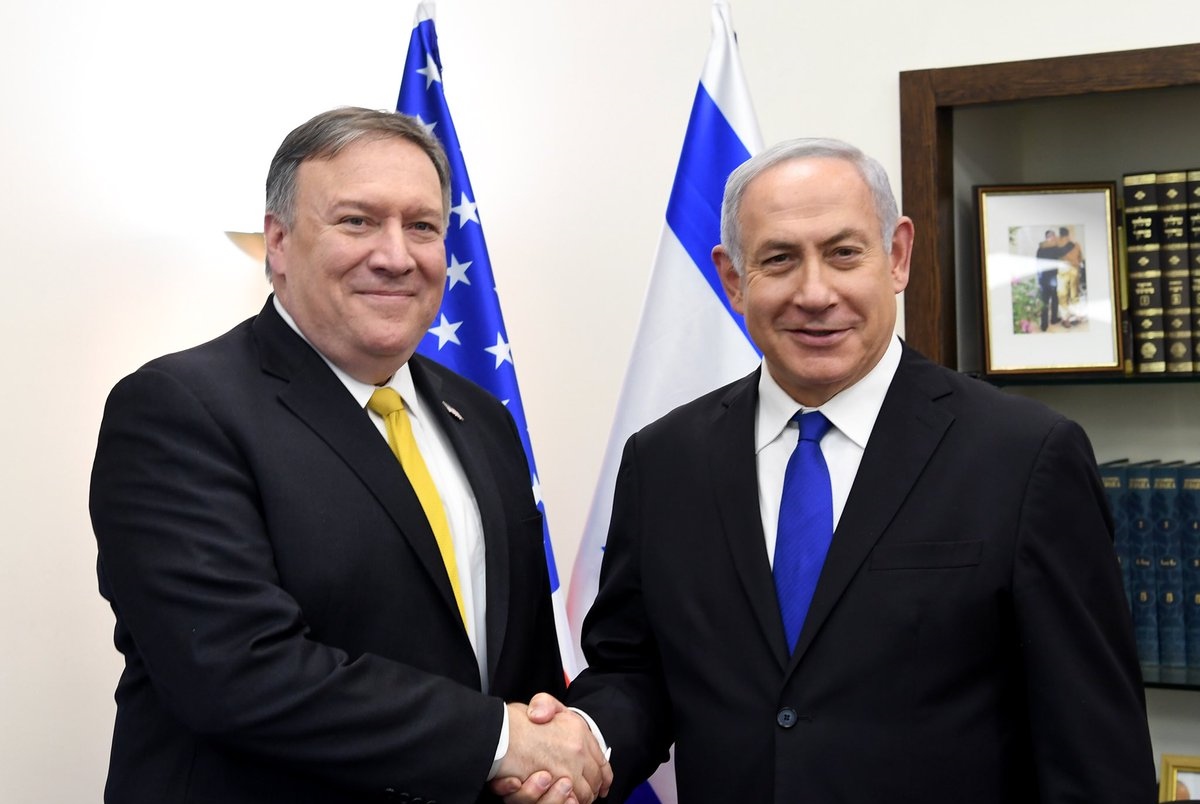Pompeo in Israel
April 30, 2018 | Expert Insights

Mike Pompeo, the US Secretary of State, met with Israeli Prime Minister Benjamin Netanyahu and reiterated Washington’s support for Israel against Iran. Pompeo noted that the US would withdraw from the Iranian nuclear deal if it was not fixed.
Background
Historically, Iran had cordial ties with a number of nations in the region, including Israel. During the Holocaust, Iranian diplomats played a key role in saving the lives of thousands of Jews.
Israel and Iran have had hostile relations since the rise of Ayatollah Khomeini after the 1979 Iranian Revolution. The two nations have engaged in numerous proxy wars and have blamed each other for terrorist attacks, assassination, and cyberattacks. Iran is involved in conflicts in Syria, where it supports anti-Israel militant groups such as Hezbollah, and in Yemen, where it is believed to support the Houthi rebels.
Israel has expressed concern Iran will soon establish a permanent military base in Syria. Israeli Prime Minister Netanyahu has stated that Tehran is turning Syria into “one large missile factory”. Israel has been critical of the 2015 Iran nuclear deal, as well as Iran’s development of ballistic missiles. In April, an Israeli strike killed 7 Iranians – following which Syria, and Tehran promised retaliation.
Read more on Iran and Israel’s ties here.
US-Israel ties
Israel and the US are staunch allies. Israel plays a key role in Washington’s overall policy in the Middle East. Israel was the largest annual recipient of American aid from 1976 to 2004. It receives $3 billion in grants every year from the US through Foreign Military Financing (FMF).
Israel also looks to US to support it during many conflicts that arise in the region. The US has used its position as a member of the UN Security Council to veto 42 resolutions that may have affected Israel. The two nations have also traditionally shared intelligence with one another. Israel remains a major purchaser of US military equipment. The Trump administration has been notably pro-Israel. In December 2017, US President Trump recognised the disputed city of Jerusalem as the capital of Israel.
Analysis
US Secretary of State Mike Pompeo recently reiterated Washington’s support for Israel. “We remain deeply concerned about Iran’s dangerous escalation of threats to Israel and the region and Iran’s ambition to dominate the Middle East remains,” Pompeo said after a meeting with Israeli PM Netanyahu. “The United States is with Israel in this fight and we strongly support Israel’s sovereign right to defend itself.”
Pompeo added that Iran had contributed to destabilising the Middle East, and called for Gulf nations to come together to combat Iran. His statement was seconded by Netanyahu, who said, “Iran must be stopped, its quest for a nuclear bomb must be stopped, its aggression must be stopped and we’re committed to stopping it together.”
Pompeo, who is known for his hawkish stance on Iran, added that the Iran nuclear accord was “very flawed,” and that if it wasn’t fixed, the US would withdraw from the deal. US President Donald Trump refused to certify Iran’s compliance with the deal in October last year. Washington hopes for its European allies to commit to improving the deal by May 12th, after which Trump could scrap the deal and re-impose sanctions on Iran.
France and Germany have attempted to convince Trump to remain in the deal. In April 2018, French President Macron met with Trump in a bid to persuade him in favour of the deal.
Read more on this visit here.
In a recent phone call, France, Germany, and UK leaders reportedly said that the JCPOA (Joint Comprehensive Plan of Action or the Iran nuclear deal) was "the best way of neutralising the threat of a nuclear-armed Iran". However, they added that Iran’s development of ballistic missiles, and “Iran's destabilising regional activity” would have to be addressed. Trump and European leaders have both been critical of the so called “sunset clause” in the agreement, which puts a 10-year limit on the deal. After this limit, Iran could potentially begin to rebuild its nuclear arsenal.
Iran has warned that if the US were to pull out from the deal, Tehran would immediately re-start its programme to enrich uranium, which can produce both nuclear fuel and weapons-grade material. On a phone call with President Macron, Iranian President Rouhani said that the deal was “not negotiable”. He said that Iran "will not accept any restrictions beyond its commitments" to comply with international rules after 2025.
Assessment
Our assessment is that the recent meeting between Pompeo and Netanyahu could reassure the Israeli leader of Washington’s continued support. We believe that having US backing may embolden Israel. However, the end of the nuclear agreement could potentially result in a more aggressive Iran, which has warned that it could resume nuclear activities. Trump has mentioned that the US may soon be withdrawing troops from Syria. Israel may fear that this could leave a power vacuum in Syria that Iran could use against Israel.








Comments